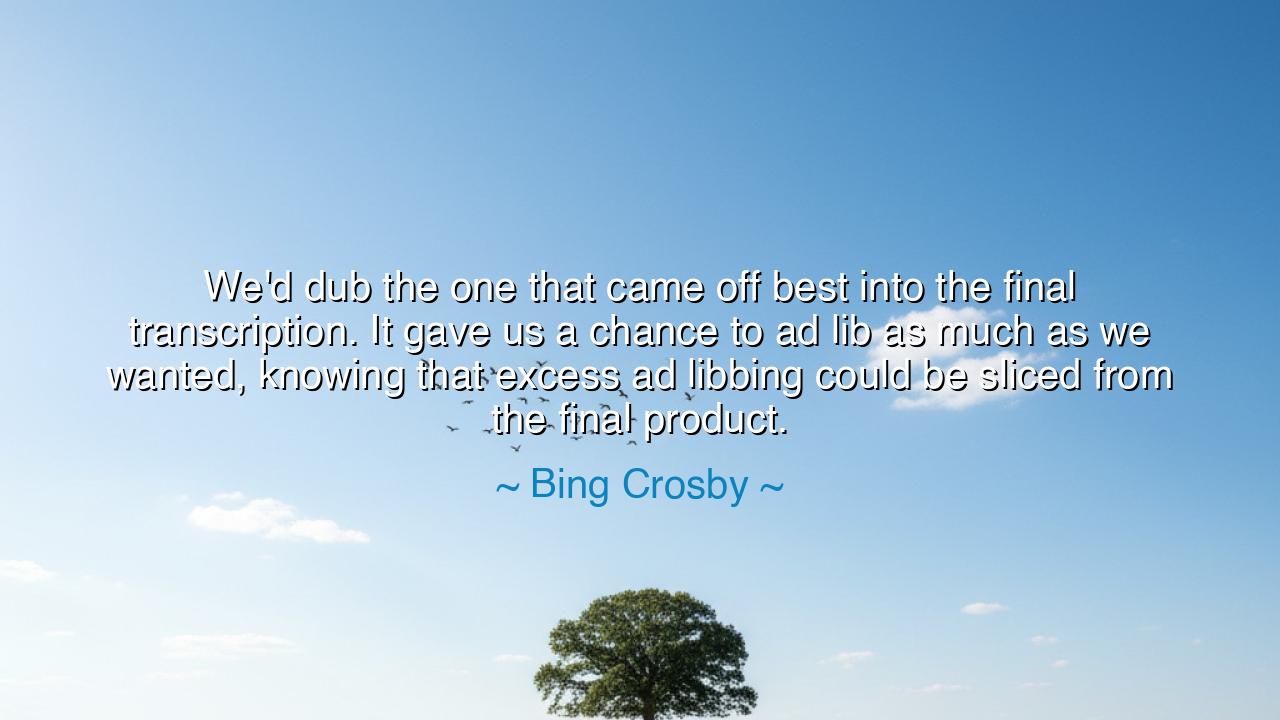
We'd dub the one that came off best into the final transcription.
We'd dub the one that came off best into the final transcription. It gave us a chance to ad lib as much as we wanted, knowing that excess ad libbing could be sliced from the final product.






In the words of Bing Crosby, "We'd dub the one that came off best into the final transcription. It gave us a chance to ad lib as much as we wanted, knowing that excess ad libbing could be sliced from the final product," we hear a reflection on the art of spontaneity and craftsmanship in the creative process. Crosby’s comment captures the delicate balance between freedom and discipline that all artists face, particularly in fields like music, radio, and performance. He speaks to the essence of creative freedom, where artists are given the space to explore, improvise, and experiment, but with the understanding that the final product must adhere to certain standards. It is an approach that allows for both individual expression and refinement, a practice that has existed throughout the ages and across all forms of artistic creation.
In the ancient world, Greek playwrights like Sophocles and Euripides would write their plays, giving actors a certain freedom in their delivery, even as the text remained fixed. The actors, while bound by the script, often improvised, bringing their own interpretation and expression to the roles. However, just as Crosby notes in his reflection on dubbing and editing, much of the excess or unnecessary improvisation would be trimmed in order to preserve the integrity of the performance and the flow of the narrative. This balance of freedom within a structured framework is key to the evolution of many art forms, from the stage to modern media.
The act of ad libbing, or improvisation, is itself an ancient tradition—one that allows the artist to connect with the moment, to speak from the heart, and to create something unpredictable and fresh. In ancient rhetoric, speakers were often trained to improvise their speeches based on the situation, appealing to their audience’s emotions and using their wits to adapt their message in real-time. Similarly, Crosby and his colleagues in the world of entertainment used improvisation to keep their performances alive, letting the spontaneity of the moment breathe life into the art. Yet, just as a skilled orator knew when to steer their speech back to the main message, Crosby’s team understood that the final product required discipline—the need to edit and refine in order to create something polished and cohesive.
There is wisdom in Crosby’s recognition of the balance between freedom and control. The process of creation often requires that we explore and take risks, allowing ourselves the freedom to experiment, knowing that not every impulse or idea will make it into the final version. This reflects the journey of the artist—the creative process is filled with moments of discovery and trial, but it is through reflection and editing that the best parts emerge. Consider Michelangelo’s work on the Sistine Chapel, where his artistic genius was often expressed through bold, free strokes of creativity, but the final product was the result of careful refinement. Michelangelo's early sketches and preliminary works were filled with improvised ideas that were eventually honed to create the masterpiece that remains a symbol of artistic excellence today.
Crosby’s quote also speaks to the importance of flexibility in the artistic process. In the face of constraints, whether in terms of time, resources, or the need for a final product, artists are called upon to be adaptable. In ancient architecture, Greek and Roman builders would sometimes improvise in response to the limitations of materials or space, turning these challenges into opportunities for innovation. The Parthenon, for instance, was designed with a slight curvature to counteract optical illusions, showing how even in the face of imperfection, creative minds find ways to improve and adapt. Just as Crosby’s ad-libs were adjusted in the final cut, these architectural decisions were made to refine and perfect the final vision.
The lesson here is not only about the art of editing but about the process of self-discipline that every artist must learn. While it is important to embrace creativity and allow for moments of spontaneity, it is equally essential to recognize when those moments need to be refined, cut, or shaped into a more cohesive form. This balance between freedom and discipline is a universal truth in all creative pursuits. Whether we are painters, writers, musicians, or leaders, the ability to release ideas freely, while also knowing when to focus and trim away excess, is the path to true mastery.
In our own lives, we must ask: how can we balance our own creativity and exploration with the discipline necessary to produce something of lasting value? Whether in our personal projects, careers, or relationships, the freedom to experiment and make mistakes is crucial to growth, but it is the reflection and refinement that bring our ideas into clarity and shape them into something meaningful. Just as Crosby and his colleagues recognized the need for both ad libbing and editing, so too must we cultivate the wisdom to balance our spontaneous ideas with the discipline required to bring them to fruition. It is this balance that defines the journey of every creator and every leader—learning when to let go and when to perfect.






AAdministratorAdministrator
Welcome, honored guests. Please leave a comment, we will respond soon